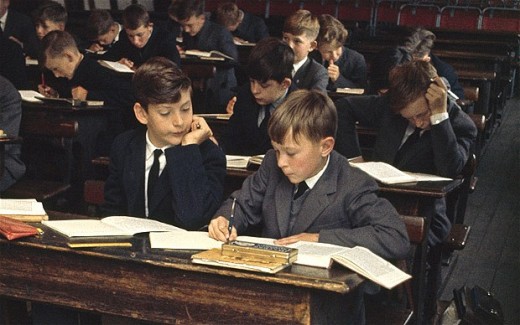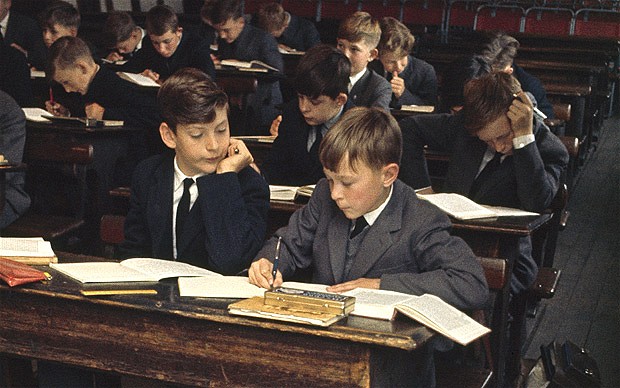How Dare Public School Types Tell Us Ex-Comp-Goers We Can’t Have Grammar Schools
When you’ve been to a comprehensive, you know just how precious a grammar school education is, says Allison Pearson

I consider myself to be a reasonable woman (except when watching Wales play rugby), but if I hear one more privately or selectively educated commentator say how “unfair” or “nostalgic” grammar schools are, then I reserve the right to go bananas with a machete. How, in all conscience, do people who have enjoyed an excellent education presume to deny that chance to academically able children from more modest backgrounds?
The wretched hypocrites are everywhere. After watching Doctor Foster on BBC One, for instance, I googled its male star, Bertie Carvel. It turns out that Bertie is the son of John Carvel who, for five years, was education editor of The Guardian, a standard-bearer for the enemies of selective education. Except, hang on, what is this I see? Little Bertie Carvel attended University College, one of north London’s finest fee-paying schools.
 Bertie Carvel. Photo: Mike Blackett / Lickerish Ltd
Bertie Carvel. Photo: Mike Blackett / Lickerish Ltd
How does that work, exactly? I really want to know. What goes on in the head (and heart) of a person who spends their days extolling the virtues of comprehensive education for other people’s kids while, on the quiet, sending their own to the best school that money can buy?
Let’s compare John Carvel with another John I met last week, when he picked me up in his cab at the airport. John raised his family on Canvey Island in Essex. When the time came for his son, Nathan, to go to secondary school, John did some research and found that the proudest boast of the local comprehensives his boy could choose from was that their pupils might get “five good GCSEs”!
“It’s pathetic,” said John. “It’s like this con trick on the working class. Is five GCSEs really all our kids are good for? Ain’t Canvey Island got no doctors? Ain’t Canvey Island got no kids who can be solicitors or accountants?”
So John’s son sat the 11-plus and got into a grammar school in Southend. Nathan is now doing a PhD in chemistry at the University of London. (“He’s got his mum’s brains.”) If John and his wife had done what the education editor of The Guardian tell the likes of them to do and sent his kid to the local comp, then Nathan would never have encountered the rigorous, dedicated teaching that set him on the path to professional success. Instead, like his cousins, Nathan would have put up with a revolving door of below-average teachers (often without a degree in their subjects), obtained a clutch of GCSEs and found a job locally that was way beneath his capabilities.
Like hundreds of thousands of young people before him (my own parents among them), Nathan has been rescued from the curse of low expectations by a grammar school, the greatest engine of social mobility this country has ever known. Increasingly desperate critics now claim that the historic ascent of grammar pupils was not down to any intrinsic merit in those schools. No, it was caused by a boom in white-collar jobs in the Sixties and Seventies.
 Parents in Sevenoaks are attempting to open the first new grammar school in 50 years Photo: Getty Images
Parents in Sevenoaks are attempting to open the first new grammar school in 50 years Photo: Getty Images
Rubbish. The top tiers of medicine, science, politics, industry, academia, the media and the law are packed with grammar-school girls and boys, now nearing retirement, who had a once-in-a-lifetime opportunity to partake of the ethos and hard knowledge that privately educated youngsters can take for granted. In 1970, there was no need for Oxford and Cambridge to have targets to take in state-school students. The quality of the grammar schools was such that it was the privately educated who were scrabbling for places.
No longer, alas. Once again, the children of means shall inherit the earth. One senior historian tells me that, these days, the only younger university lecturers who have working-class origins are from Northern Ireland. It’s no coincidence that Ulster happens to be the last part of the United Kingdom to have retained the 11-plus. Read my lips: it’s the grammar schools, stupid!
The public knows this, which is why a recent poll showed 60 per cent support for more grammar schools. A Conservative government should heed that message. As for that tear-stained, Left-wing commentator (educated at a leading public school, obviously) who said he didn’t know how grammar school kids lived with the guilt of having got a place when other kids didn’t… do you suppose that the players in the Rugby World Cup are consumed with guilt about being in the top team when so many unco-ordinated nerds will never play for their country? Are the professionals on Strictly Come Dancing in permanent mourning for plainer humans with two left feet? Or do they revel in their gifts and seek the best possible specialist training?
When you’ve been to a comprehensive, you know just how precious a grammar school education is, says Allison Pearson
Telegraph Columnists: daily opinion, editorials and columns from our star writers
(76)




